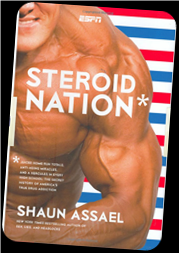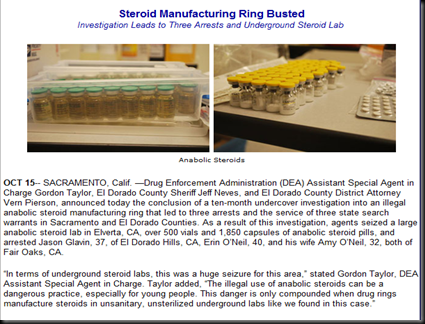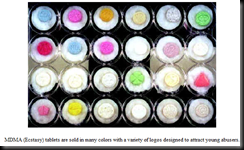In February 2010 in New Orleans, three men were charged by the U.S. Drug Enforcement Administration (DEA) with drug-trafficking Ecstasy, or MDMA (3-4-Methylenedioxymethamphetamine), a synthetic chemical that can be derived from an essential oil of the sassafras tree.
If convicted, the defendants face a possible maximum sentence of 20 years in prison, a $1 million fine and at least three years of supervised release for each count.
MDMA is also one of the easiest illegal drugs to obtain. Its effects are similar to those of amphetamines and hallucinogens. First developed as an appetite suppressant in 1912, MDMA was used as a psychotherapeutic tool and also started to become available on the street is the late 1970s and early 1980s. It wasn’t until 1985 that Ecstasy was made illegal. It is classified as a “Schedule 1” controlled substance along with other narcotics like heroin, cocaine and LSD.
One reason Ecstasy can be especially dangerous is the lack of content control. Ingredients are hard to get and manufacturers of the drug often use substitutes, mixing other harmful additives with the already dangerous mix. This practice is so common that “drug test kits” are often sold with the drug so users can test for purity.
Because of the uncertainties about the drug sources, pharmacological agents, chemicals used to manufacture them, and possible contaminants, it is difficult to measure the toxicity, consequences and symptoms that might be expected.
Herbal Ecstasy is another form of MDMA that is composed of ephedrine or pseudoephedrine hydrochloride and caffeine from the kola nut. Also sold in tablet form, Herbal Ecstasy can cause permanent brain damage and death. Though not currently classified as a controlled substance, Herbal Ecstasy shares many of the same qualities and effects as MDMA. Also known as Cloud 9, Herbal Bliss, Ritual Spirit, Herbal X, GWM, Rave Energy, Ultimate Xphoria and X.
Anabolic Steroids
Anabolic steroids are synthetically produced versions of the naturally occurring male hormone, testosterone. Both males and females have
 testosterone produced in their bodies: males in the testes, and females in the ovaries and other tissues. The full name for this class of drugs is androgenic (promoting masculine characteristics) anabolic (tissue building) steroids (the class of drugs).
testosterone produced in their bodies: males in the testes, and females in the ovaries and other tissues. The full name for this class of drugs is androgenic (promoting masculine characteristics) anabolic (tissue building) steroids (the class of drugs). Some of the common street names for anabolic steroids include: arnolds, gym candy, pumpers, 'roids, stackers, weight trainers and juice. Currently, there are more than 100 different types of anabolic steroids that have been developed, and each requires a prescription to be used legally in the U.S.
Anabolic steroids can be taken orally, injected intramuscularly, or rubbed on the skin when in the form of gels or creams. These drugs are often used in patterns called cycling, which involves taking multiple doses of steroids over a specific period of time, stopping for a period, and starting again. Users also frequently combine several different types of steroids in a process known as stacking. By doing this, users, more properly abusers, believe that the different steroids will interact to produce an effect on muscle size that is greater than the effects of using each drug individually.
Another mode of steroid use is called "pyramiding." With this method abusers slowly escalate steroid use (increasing the number of drugs used at one time and/or the dose and frequency of one or more steroids), reach a peak amount at mid-cycle and gradually taper the dose toward the end of the cycle. The escalation of steroid abuse can vary with different types of training. Bodybuilders and weight lifters tend to escalate their dose to a much higher level than do long distance runners or swimmers.
Legislation and Enforcement
On March 16th 2004, Joseph Rannazzisi, then deputy director of the DEA's Office of Diversion Control, said in testimony before the House Subcommittee on Crime, Terrorism and Homeland Security:
 "The DEA has one mission: to protect the public from dangerous drugs. However, the current law regarding steroids causes regulatory delay, especially with respect to steroids that we know are hormonally, chemically or pharmacologically related to testosterone. Because DEA’s authority extends only to controlled substances, steroids that are not classified as controlled substances continue to fall outside our jurisdiction. H.R. 3866 [The Anabolic Steroid Control Act of 2004 ] will correct this problem."
"The DEA has one mission: to protect the public from dangerous drugs. However, the current law regarding steroids causes regulatory delay, especially with respect to steroids that we know are hormonally, chemically or pharmacologically related to testosterone. Because DEA’s authority extends only to controlled substances, steroids that are not classified as controlled substances continue to fall outside our jurisdiction. H.R. 3866 [The Anabolic Steroid Control Act of 2004 ] will correct this problem." Well, the Anabolic Steroid Control Act passed in October 2004.

On the bill's passage, one of its sponsors, Sen. Orrin Hatch (R-UT), remarked:
"Under this bill, clever chemists will no longer be able to dodge the law by disguising their chemicals to skirt the legal definition of a steroid. Our bill gives the Drug Enforcement Agency the power to schedule nearly any steroid precursor now or in the future--giving the law flexibility we don't have to play catch-up with every new andro look-alike that comes along."
On September 29, 2009, the DEA's Rannazzsi, now deputy assistant administrator, said this in testimony before the Subcommittee on Crime and Drugs:
"Although DEA does not have the authority to enforce DSHEA [the Dietary Supplement Health and Education Act of 1994], DEA does have statutory authority to investigate incidents involving the illegal manufacture and distribution of anabolic adrenergic steroids in the dietary supplement market. [...] DEA has the authority and responsibility to investigate companies that are marketing products as dietary supplements that are adulterated with controlled substances."
As well the DEA should; if yogurt were suddenly used as a delivery vehicle for sports steroids, would our guardians of public health call for a new law restricting access to yogurt or would increased enforcement and enforcement funding be directed to the DEA to get the job done? The latter, I would think.
If supplements are being adulterated by illegal labs, why then should supplements get a bad rap? Steroids and sports doping is all about unethical pharmacies and illegal labs.
Case in point, in January 2009, a 198-count DEA indictment was unsealed charging 12 pharmacists and pharmacy owners with participating in a conspiracy that dispensed and sold thousands of dosages of anabolic steroids, including powerful veterinary steroids approved for animal use only.
Another case in point: in October 2009 the DEA announced the completion of a 10-month undercover investigation into an illegal anabolic steroid manufacturing ring that led to three arrests. In the raid, agents seized over 500 vials and 1,850 capsules of anabolic steroid pills.

While the U.S. Food and Drug Administration (FDA) has been involved in sweeps relating to the illegal sale of unapproved or misbranded drugs, such as the recent Internet sweep in November 2009 called the "International Internet Week of Action," many observers, including this commentator, strongly believe that all investigation and enforcement of sports doping and illegal steroid distribution and use should immediately be more clearly placed under the aegis of the DEA, as sports doping is not a problem of food products (such as supplements) but a problem of drugs---a problem of dope, pure and simple.










